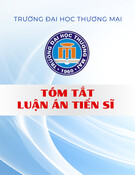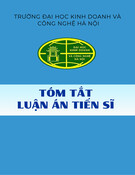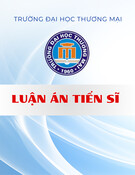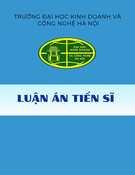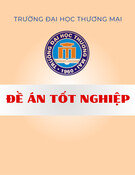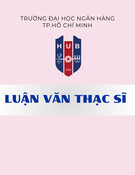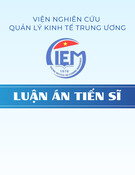
2
CHAPTER 1: INTRODUCTION
1.1 BACKGROUND
Banking institutions have played an important role in connecting the
economy and pioneering the implementation of global trends such as
corporate social responsibility (CSR). Commercial banks are trying to
exploit the positive aspects of CSR’s activities to maximize the benefits
associated with increasing brand equity and financial performance (Saeidi
et al., 2015). Some managers believe that CSR is simply charity work
while CSR includes internal factors, other managers think that barrier of
implementing CSR’s practices is due to lack of human resources,
financial resources and implementation techniques (Nguyen Dinh Tai,
2010). According to Sprinkle and Maines (2010), any organizations must
pay attention to its impacts on environment and social security. Although
understanding social needs, banks or enterprises can hardly give up their
goal of maximizing profits (Sprinkle & Maines, 2010). Therefore, the
harmony between CSR’s activities and financial performance, that is good
for society and benefits for organizations are absolutely legitimate and
necessary.
According to Fatma et al. (2016a), each industry needs reliable
measurement tools for evaluating stakeholders’ perpection. In addition,
few CSR’s studies in the Asian context (Chapple & Moon, 2005; Fatma et
al., 2014). Compared to other industries, banking industry is effected by
brand, reputations and negative information about reputation that will lead
to negative actions of stakeholders (Thompson & Cowton, 2004). Retail
banks spent a lot of money on CSR’s programs to strengthen brands
(McDonald & Rundle-Thiele, 2008). The importance of brand equity in
the service sectors is crucial because their products and services are
intangible, so the trust of stakeholders is needed (Pérez et al., 2013). In
the context of restructuring Vietnamese banking system, in order to
enhancing brand equity and financial performance through CSR’s
programs of JSBs in Mekong Delta, the issues to be addressed are
measuring the impacts of CSR’s perception of customers, employees and
managers. From the above reasons, the study "The relationship between
corporate social responsibility, brand equity and financial performance
of joint-stock commercial banks in Mekong Delta" is a controversial
topic.






